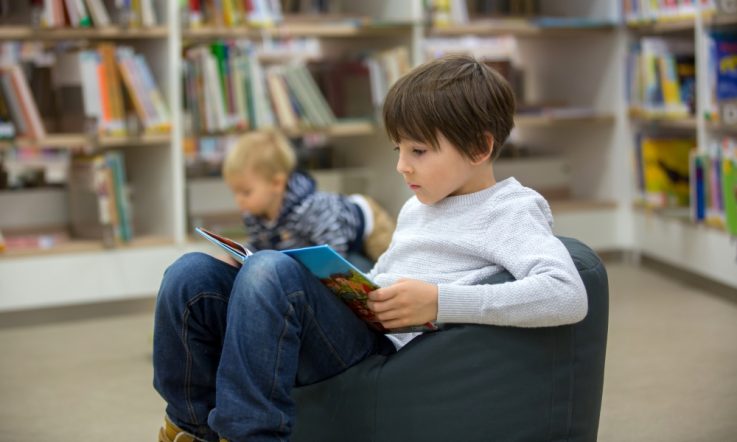Reading for pleasure has been shown to have a powerful influence on children’s learning; in developing vocabulary, but also spelling and maths skills. In our latest reader submission about learning during lockdown, Junior School Curriculum Director Vanessa Collins shares details of the ‘Just Read’ action research project to build a culture of reading at Sydney’s Queenwood School for Girls, and ignite in students a love of reading for pleasure.
Increasing concern over a lack of student engagement in reading for enjoyment amongst many of our students led to the genesis of a research project entitled ‘Just Read’.
Driven by a deep passion for literacy and a desire to ignite in students a love of reading for pleasure, the project centred on three key questions: Does engagement in daily timetabled sustained silent reading (SSR) improve K–12 students’ attitudes toward reading for pleasure? Is engagement in daily timetabled Sustained Silent Reading (SSR) associated with gains in Year 4-10 students’ literacy skills? What are the characteristics of a best-practice model for SSR?
Continuing through the pandemic
At the time of embarking on Just Read, in January 2020, Queenwood’s Literacy Committee was excited about the project and its potential to assist in building a culture of reading in the school. Little did we know that COVID-19 was just around the corner and very quickly, another question would dominate our thoughts – What happens to a school-based reading project during a global pandemic? It’s not a question the committee had anticipated, but one with some surprisingly positive answers.
Just Read had been planned in detail. The project had the backing of an Association of Independent Schools research grant and we were guided by leading literacy expert Dr Margaret Merga from Edith Cowan University, who acted as our mentor, supporting us as we navigated our way through ethics applications and data collection protocols.
We launched our SSR model with all teachers and students from Kindergarten to Year 11 reading on a daily basis. Teacher role modelling was a cornerstone of Just Read and it was important to the project that all teachers were in classes reading with the students.
The model also included time to discuss the books being read. In the Junior School this took the form of student-led book talks. We were planning a very comprehensive pre- and post-data collection process involving surveying all teachers across the school and students in Years 4-10 together with the analysis of PAT (Progressive Achievement Tests) reading and vocabulary assessments.
The first data collection round went ahead as planned in November 2019. After that point, almost nothing went ahead as planned.
When lockdown became a reality, like all schools, we were striving to provide a home learning model that would support our families at a very challenging time. The Literacy Committee made a decision to attempt to keep Just Read alive in some form.
It was decided to build daily reading into home learning timetables. It was at this point that the formal side of the project took a back seat. We knew that our data would be ‘COVID affected’. After all, key aspects of Just Read – such as teachers modelling reading and the whole school stopping to read on a daily basis – were just not possible.
Ensuring access to school library books
We remained optimistic however, that aspects of the project might be transferrable to the home learning environment.
In the Junior School, our Librarian supported the project by developing ‘Click and Collect’ – an innovative and completely contactless way for parents and students to continue accessing school library books during lockdown.
Families were able to browse the library collection and reserve books online. These were boxed and collected by parents in a remote section of the school carpark. Returning books during this time was somewhat of a challenge. After being left for a week as a safety precaution the books were sanitised and returned to the shelves. For many families this process made continuing Just Read at home a reality.
It is no secret that many families struggled during lockdown. The stories of parents grappling with working from home while attempting to ensure schoolwork was being completed are well documented. We were concerned that asking parents to find time each day for their children to read for pleasure might be just another requirement that would bring pressure to households already at breaking point.
Bringing normality to the day
In fact, the opposite occurred; Just Read brought a sense of calm and continuity to our families during lockdown. Prior to moving to online learning, parents had praised the project at its launch with one parent commenting: ‘A wonderful way to foster literacy development across the ages. A welcome addition to the school day’ and another reflecting after several weeks of the program on the attitudinal change already starting to occur: ‘In the past my daughter was seen as “strange” for always having a book in her hand. Now it’s the norm for girls to carry a book. Reading is now cool’.
During lockdown the school decided to conduct a parent survey to help us refine our home learning model. We asked parents specifically about Just Read at home. The feedback from parents was extremely positive with the issue of wellbeing taking centre stage. ‘Both daughters love Just Read at home. It makes them calmer, quieter and more interested in each other and the world.’ One parent commented that Just Read at home was the ‘happiest part of our otherwise chaotic day’.
For our students, bringing Just Read from the classroom to home was an easy transition and one which brought a sense of normality to the home learning day, something so many of our students craved during lockdown. Perhaps more surprising was the significant number of families who began to read as a whole, with parents taking up the Just Read challenge thrown out to them by their children!
Adult role models
Part of our research was to explore the impact of adult role modelling. There are strong indicators that seeing teachers reading on a daily basis, even for a short period of time, did have an impact as our students sought to have their parents take up this adult role during lockdown.
Parents commented that reading together gave them a whole range of new topics for dinner time conversations. This was not at all what our Literacy Committee had envisioned for the ‘book talk’ aspect of the project. Children were asking their parents and even extended family what books they were reading and getting family members to share a favourite section of their book. One parent commented: ‘Just Read at home is great! In fact, she has an hourly Skype with Granny and they read to each other and then discuss their favourite characters. It’s wonderful to listen to!’
Our Just Read project set out to build a culture of reading and ignite in students a love of reading for pleasure. COVID-19 may have changed the course of the project, but it provided us with a unique opportunity to explore the link between reading and wellbeing.
COVID-19 showed us just how vital a sense of normality is to maintaining the wellbeing of young learners. Just Read helped provide normality to our students during lockdown and provided a welcome platform for families to read and talk together.
Despite the challenges of lockdown, our Just Read project has continued with COVID-19 serving to reaffirm the value of striving to build a culture of reading in our school.
Do you set aside time each day for students to do free reading, purely for enjoyment?
As a teacher or school leader, do you role model reading for pleasure? Do you discuss your own reading preferences, experiences and recommendations with students?



